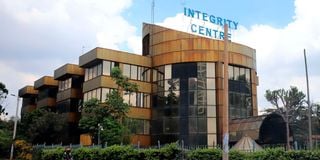Premium
EACC asks for more funds to fight corruption

Integrity Centre in Nairobi which houses the Ethics and Anti Corruption Commission offices.
What you need to know:
- The commission, in its Strategic Plan 2023-2028, hopes to upscale investigations on corruption, economic crimes and bribery.
- Going forward, the EACC said, it will leverage on technology even as it called for concerted efforts in fighting the vice.
The Ethics and Anti-Corruption Commission (EACC) will require an estimated Sh37.1 billion to effectively deter and punish corruption.
The commission, in its Strategic Plan 2023-2028, hopes to upscale investigations on corruption, economic crimes and bribery.
EACC plans to step up follow-up of cases and closely supervise the implementation of measures to prevent graft in partnership with other oversight agencies. It will also automate its monitoring and evaluation systems.
Going forward, the EACC said, it will leverage on technology even as it called for concerted efforts in fighting the vice.
And, following the renewed commitment by President William Ruto to fight corruption, the EACC will prioritise “high impact cases,” the chairperson, Mr David Oginde, said during the launch of the document yesterday.
“Our efforts will focus on highly influential and high profile suspects. But we are also going for the small yet highly exposed individuals,” Mr Oginde said.
Mr Oginde called on the clergy to make “deliberate efforts to preach against corruption”.
“Kenya as a country is religious. But [our religious beliefs do not mirror] our daily lives,” he said.
The commission, which decried the politicisation of the war against corruption, saying it hampers efforts made in fighting “the monster”, called on the government to consider allocating more resources to the EACC to enable it eradicate the vice.
“If we want to counter this monster, the political culture of tokenism in this nation must change,” EACC Chief Executive Officer Twalib Mbarak said.
However, Mr Mbarak lamented that under-staffing, inadequate resources, and the low budgetary allocation to the commission was a huge impediment in the fight against corruption.
With less than seven years to the realisation of the Vision 2030 economic development blueprint, Prime Cabinet Secretary Musalia Mudavadi said the government would not achieve its goals if it tolerates corruption.
“The EACC must, therefore, provide leadership as other agencies coalesce around it. We all must participate in changing the society values,” he said.
“If we work together, we will succeed in taming the tide of corruption,” he added. “The government will provide ample resources to EACC. We're sending a clear message that corruption will find no refuge on our land.”
According to Auditor-General Nancy Gathungu, the tendering phase procurement is the most vulnerable to graft.
“Corruption weakens financial systems and weakens development. It also reduces public trust in the government,” she said, adding that the vice has a devastating effects on the poor and the vulnerable in the society.
“Decisive action has been the weak link in fighting corruption. If we're not careful, we might not achieve the sustainable development goals,” the auditor-general warned.
The regional representative of the United Nations Office of the Drugs and Corruption, Mr Neil Walsh, said the UN was committed to working together with Kenya to eradicate the vice.
Justice Esther Maina of the Economic Crimes Division of the High Court, while calling for collective effort in the war, said the judiciary was devoted to routing out corruption in the country.
“It is a unity of purpose that will turn the tide of corruption in the country,” Justice Maina said.





